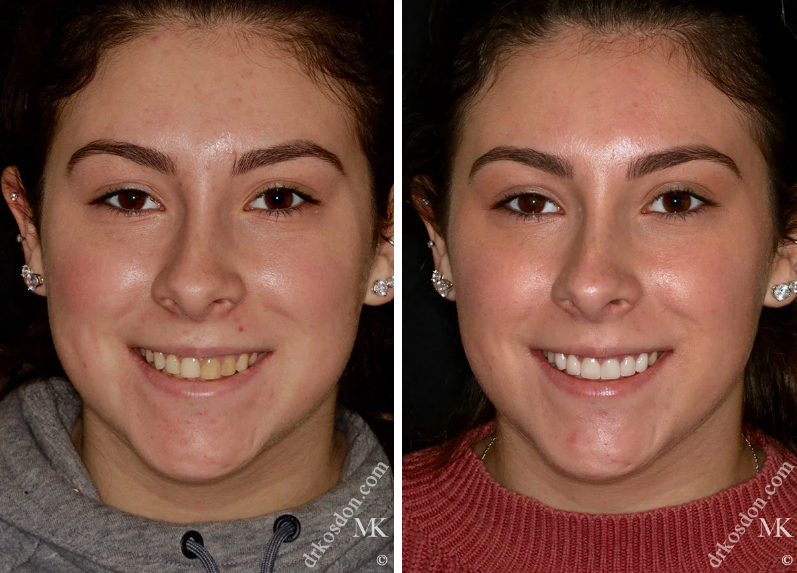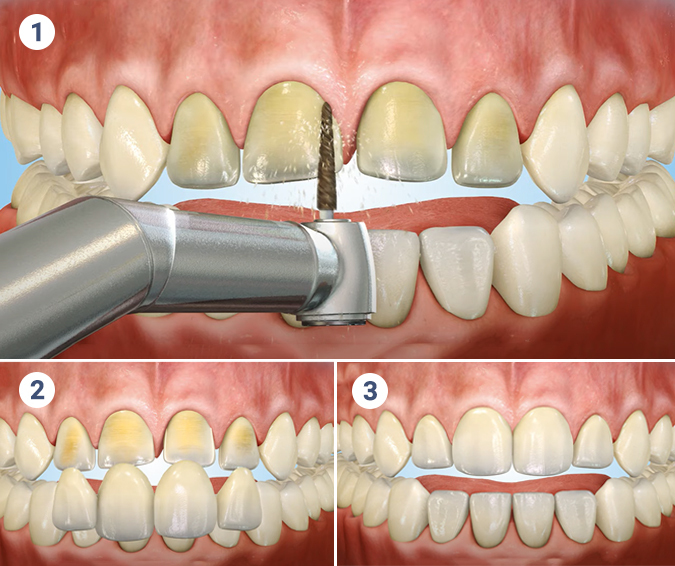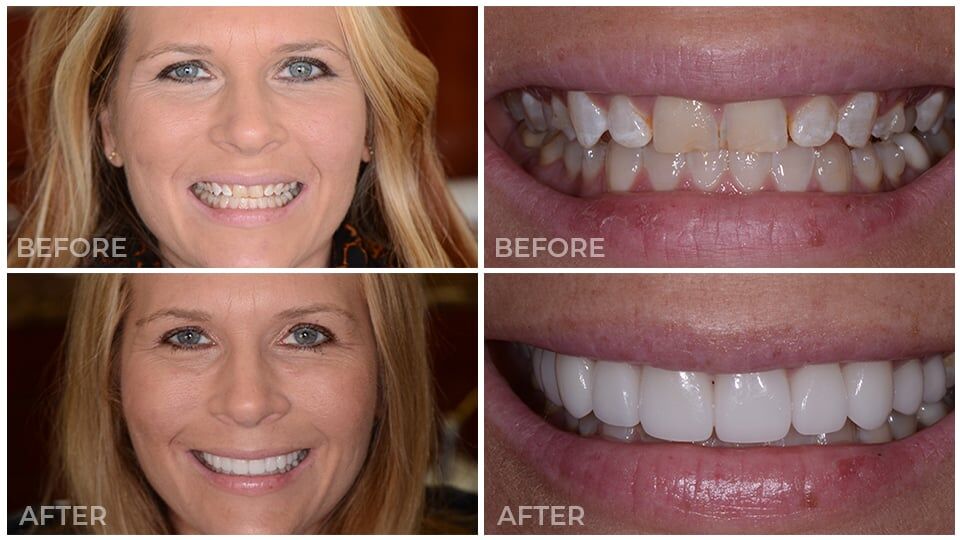Unlocking the Tricks of Veneers: Truths, Kinds, and Benefits for an Attractive Smile
Veneers use a compelling service for those looking for to improve their smiles. These oral enhancements can attend to different flaws, from discoloration to misalignment. With options like porcelain and composite, people can pick based on their preferences and needs. Comprehending the subtleties of veneers, consisting of application and treatment, is essential. What aspects should one take into consideration prior to choosing? The solutions may shock those curious about this aesthetic dental alternative.

Recognizing Veneers: What Are They?
Veneers are slim, custom-made coverings designed to cover the front surface of teeth, boosting their look. Normally crafted from durable products, these coverings are customized to fit each person's teeth precisely. They serve several functions, including remedying visual imperfections such as staining, chips, or voids. The application procedure entails a dental practitioner preparing the teeth, usually by eliminating a little quantity of enamel to ensure a tight fit. Once prepared, the veneers are bound to the teeth utilizing a solid adhesive.
Individuals commonly choose veneers for their capability to produce a natural-looking smile while offering a long-lasting option to oral imperfections. Unlike other cosmetic dental care alternatives, veneers need very little intrusive treatments, making them a preferred choice. The result is an enhanced smile that can substantially improve an individual's confidence and self-worth. Overall, veneers offer a reliable method to accomplishing a more attractive and harmonious oral look.
Kinds of Veneers: Porcelain vs. Compound
When considering cosmetic dental options, two key kinds of veneers stand apart: porcelain and composite. Porcelain veneers are crafted from a resilient ceramic product that resembles the all-natural look of teeth. They are recognized for their stain resistance and ability to reflect light in a similar way to natural enamel, offering an aesthetic appeal that several individuals need. The application procedure generally entails even more prep work of the tooth framework and may need numerous sees to the dental expert.
On the various other hand, composite veneers are made from a tooth-colored resin that is directly used to the teeth. This type permits quicker application and can often be finished in a single check out. While they are less costly than porcelain veneers, they might not provide the same durability or resistance to discoloration. Eventually, the option in between porcelain and composite veneers depends upon private choices, spending plan, and specific oral demands.
The Advantages of Deciding On Veneers
Choosing veneers supplies various benefits that can substantially improve both the aesthetic appeals and functionality of an individual's smile. Among the key benefits is their ability to deal with flaws such as discoloration, gaps, and imbalance, leading to a more uniform look. Veneers can additionally enhance the sturdiness of teeth, providing a safety layer that guards them from damage.
Additionally, they require minimal tooth prep work contrasted to other dental procedures, preserving more of the natural tooth framework. This conservation adds to a much healthier oral setting while still attaining a stunning smile.
Veneers are highly adjustable, permitting individuals to select the shape, size, and shade that best matches their preferences. Additionally, they are stain-resistant, making it easier to preserve a eye-catching and brilliant smile in time. In general, veneers offer an efficient alternative for those seeking both cosmetic improvement and lasting dental health advantages.
The Veneer Application Refine
The veneer application procedure entails several key actions to assure optimal outcomes. An examination is conducted to evaluate the person's requirements, complied with by the preparation and shaping of the teeth. The veneers are bonded in area, with modifications made for an ideal fit and appearance.
First Consultation Tips
A complete initial assessment is important for any person taking into consideration veneers, as it establishes the foundation for a successful treatment. Throughout this meeting, the dental professional assesses the person's oral health and wellness, discussing any kind of existing issues that might affect the veneer application. This evaluation might consist of X-rays and an aesthetic examination to identify the problem of the teeth and periodontals.
The dental practitioner also engages the client in a comprehensive conversation regarding their aesthetic goals, preferences, and expectations. They might offer different veneer alternatives customized to the patient's certain needs. Additionally, the expert describes the treatment, prospective threats, and aftercare needs, making sure that the patient is comfortable and knowledgeable prior to waging the treatment.
Preparation and Shaping Teeth
After the preliminary examination, the next phase includes the preparation and shaping of the teeth to fit the veneers. This crucial action is done by the dental practitioner, who thoroughly analyzes the tooth framework to identify the amount of enamel that requires to be gotten rid of. Normally, a thin layer, typically around 0.5 millimeters, is slashed off to ensure an appropriate suitable for the veneers. Precision is extremely important during this process, as it influences both the aesthetic result and the general convenience. When the teeth are properly shaped, impressions are taken to create custom veneers that straighten perfectly with the client's dental account. This careful preparation sets the stage for an effective veneer application, improving both look and feature.
Bonding and Final Modifications
Complying with the shaping and preparation of the teeth, the bonding process begins, marking an essential stage in the veneer application. Throughout this phase, a dental adhesive is put on the ready tooth surface, ensuring a solid bond between the tooth and the veneer. The dental practitioner carefully positions the veneer, making modifications to attain the wanted alignment and visual appeals. When appropriately placed, an unique light is made use of to heal the sticky, solidifying the bond. After treating, the dental practitioner carries out last adjustments, cutting any excess product and refining the veneer's form to assure an all-natural look. This mindful attention to information improves both feature and visual appeals, adding to a total stunning smile that is durable and durable.
Caring for Your Veneers: Maintenance Tips
Taking care of veneers is vital to preserve their appearance and long life. A constant daily cleaning routine, conscious evasion of staining foods, and normal dental check that examinations are crucial components of effective maintenance. These practices help ensure that veneers stay in peak problem and remain to boost one's smile.
Daily Cleansing Regimen
Consistently keeping veneers is important for their durability and appearance. A proper everyday cleaning regimen can help preserve their luster and stop damages. Dental practitioners advise cleaning twice a day with a soft-bristled toothbrush and fluoride tooth paste, making certain that all surfaces are cleaned up delicately to avoid scratching the veneer surface area. Flossing everyday is likewise essential to eliminate food particles and plaque from in between teeth, where brushes might not reach. Furthermore, making use of an antimicrobial mouth wash can assist maintain dental health without harming the veneers. It is recommended to avoid abrasive cleansers and devices that can scratch the veneer. By following these simple steps, individuals can keep their veneers looking stunning while promoting general oral health.
Staying Clear Of Discoloration Foods
Although veneers are created to enhance the appearance of teeth, their susceptibility to staining demands cautious dietary selections. It is important for individuals with veneers to be conscious of specific foods and beverages that can lead to staining. Dark-colored products such as coffee, red white wine, and berry juices should be eaten in moderation, as they are understood to discolor both all-natural teeth and veneers. In addition, acidic foods like citrus fruits canister weaken the bonding representatives utilized in veneers, making them much more prone to discoloration. To maintain an intense smile, it is recommended to wash the mouth with water after taking in discoloration foods and to practice routine oral hygiene. These thoughtful selections add considerably to the long life and aesthetics of veneers.

Regular Oral Examinations

Preserving the stability of veneers requires a dedication to routine dental check-ups, as these visits play an essential function in guaranteeing their durability and appearance. Throughout these gos to, oral experts can assess the problem of the veneers, inspecting for any kind of signs of wear, damage, or underlying oral problems. Additionally, regular cleanings aid remove plaque and tartar that can collect around the veneers, advertising overall oral health. Dental experts can also give tailored recommendations on treatment strategies and items suited for veneer maintenance. By sticking to a routine of exams, people can resolve prospective issues early, guaranteeing their smile stays vivid and gorgeous. Inevitably, routine dental visits are an essential element of veneer treatment.
Is Veneers the Right Option for You?
Making a decision whether veneers are the right option often depends upon private visual objectives and dental requirements. For those seeking to deal with issues such as discoloration, chips, or misalignment, veneers can give a transformative option. Candidates usually include individuals with healthy and balanced teeth yet prefer a boosted smile.
Nevertheless, it is essential to think about factors such as tooth enamel condition, the level of dental issues, and the willingness to preserve veneers - Veneers Teeth. Consulting with an oral professional is essential, as they can review dental health and establish if veneers appropriate
Additionally, possible candidates must show on the long-term commitment, as veneers may call for substitute every 10-15 years. Price considerations likewise play a significant role, as veneers can be a considerable financial investment. Inevitably, the choice must be educated, stabilizing visual desires with functional factors to consider for long-term outcomes.
Frequently Asked Inquiries
The Length Of Time Do Veneers Commonly Last Prior To Needing Substitute?
Veneers typically last in between 10 to 15 years before needing replacement. Elements such as oral hygiene, way of life options, and worldly quality over at this website can influence their longevity, making normal dental exams vital for preserving their condition.
Are Veneers Safe for Individuals With Sensitive Teeth?
Veneers can be safe for individuals with sensitive teeth, but it usually depends upon the severity of level of sensitivity and the dentist's strategy. Consulting an oral specialist prior to continuing is vital to guarantee perfect outcomes.
Can Veneers Be Gotten Rid Of or Changed Conveniently?

Do Veneers Spot With Time, and How Can I Avoid It?
Veneers can tarnish with time, especially from foods and drinks like coffee or merlot. To avoid staining, maintaining good oral hygiene, using a straw for drinks, and normal dental cleanings are suggested methods.
What Is the Cost Range for Obtaining Veneers?
The expense of veneers commonly varies from $500 to $2,500 per tooth, relying on factors such as product type, dentist experience, and location. Clients should consult with dental professionals for customized quotes and funding options.
Once the teeth are properly shaped, impressions are taken to create custom veneers that straighten flawlessly with the patient's dental profile. Throughout this phase, an oral adhesive is applied to the prepared tooth surface area, guaranteeing a strong bond between the tooth and the veneer. It is crucial to take into account variables such as tooth enamel problem, the level of dental concerns, and the desire read this post here to preserve veneers. Veneers can be safe for people with sensitive teeth, yet it commonly depends on the seriousness of level of sensitivity and the dentist's method. The expense of veneers commonly varies from $500 to $2,500 per tooth, depending on factors such as product type, dental professional experience, and area.